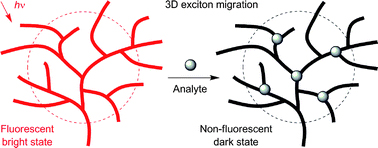A team of scientists led by Ben Zhong Tang at The Hong Kong University of Science & Technology, China, have developed a highly sensitive chemosensor for detecting explosives.
The sensor is based on the quenching of fluorescence. Light emission of a hyperbranched poly(silylenephenylene) is quenched exponentially by picric acid, with quenching constant up to 1.5 × 105 L mol−1. This superamplification effect makes the polymer a highly sensitive chemosensor for explosive detection.
Interested to know more? Read the full article here:
Jianzhao Liu, Yongchun Zhong, Ping Lu, Yuning Hong, Jacky W. Y. Lam, Mahtab Faisal, Yong Yu, Kam Sing Wong and Ben Zhong Tang, Polym. Chem., 2010, 1, 426-429 DOI:10.1039/C0PY00046A











